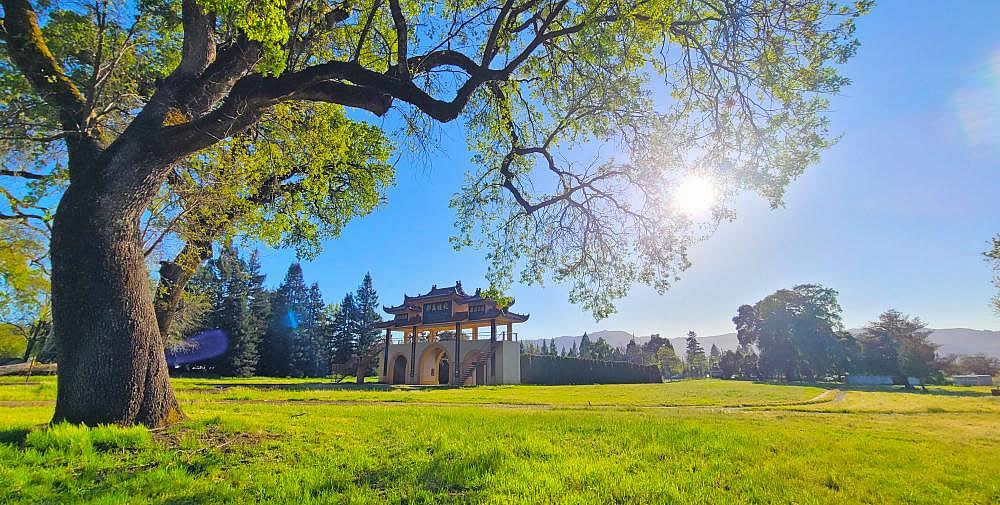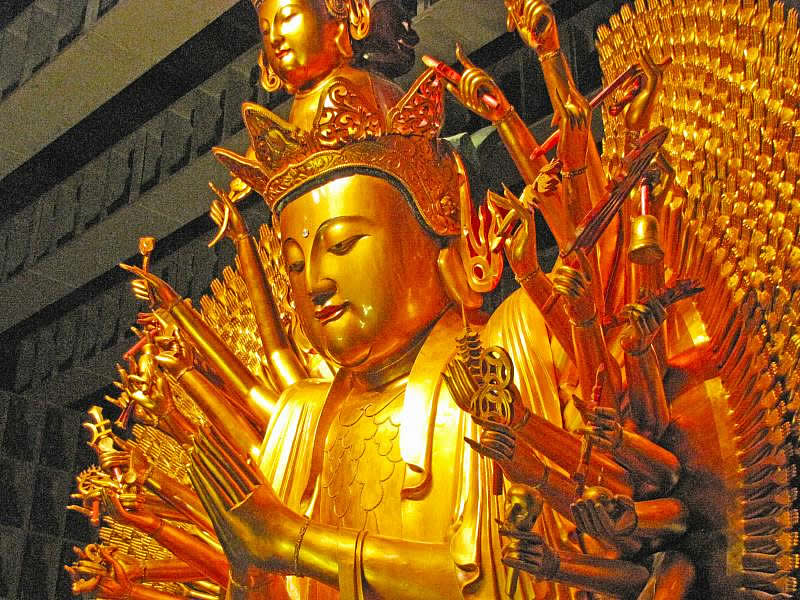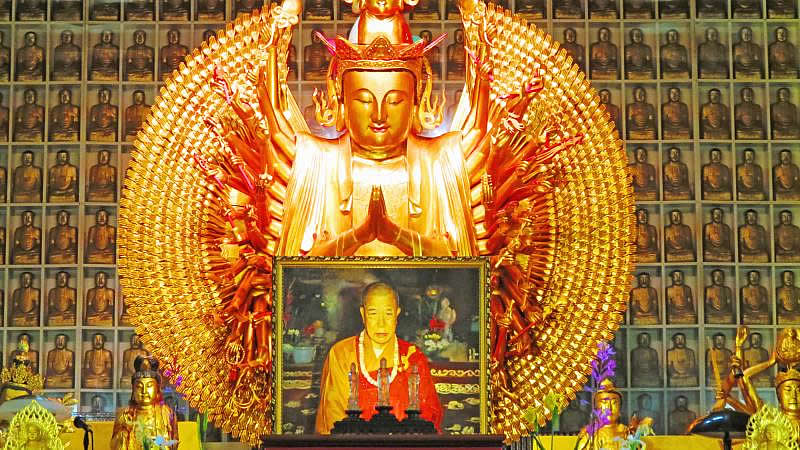 |
|
Being in tune with Guan Shr Yin Bodhisattva

A Talk given by Susan Rounds, October 21, 2025
Tonight I am going to share with you some of the things I have learned from my practice of reciting the name of Guan Shr Yin Bodhisattva. This has been my practice since I became a Buddhist 50 years ago.
Being in tune with Guan Shr Yin Bodhisattva

In the 25 Sages Speak of Enlightenment chapter of the Shurangama Sutra, the Dharma Prince Great Strength Bodhisattva explains it like this:
Consider someone who is always thinking of another person. This second person, though, has completely forgotten about the first person. Even if these two people were to meet, they might as well not have met, and even if they were to catch sight of one another, they might as well not have seen each other.
But consider two other people who always have each other in mind so much so that they will be, in lifetime after lifetime, as inseparable as a man and his shadow. …. In the same way, beings who are always mindful of the Buddha, always thinking of the Buddha, are certain to see the Buddhas now or in the future. They will never be far from the Buddhas….”
The Venerable Master explained it with an analogy to a radio. Guan Shr Yin bodhisattva is always broadcasting, but if we don’t have our radio on, we can’t receive the signal. So one of the benefits of recitation, of being mindful of Guan Shr Yin Bodhisattva, is that we bring ourselves into Guan Shr Yin Bodhisattva’s neighborhood. Isn’t that a wonderful place to be?
In Listen to Yourself: Think Everything Over, the Master says:
When you recite Na Mwo Guan Shr Yin Pu Sa, you are mindful of Guan Yin Bodhisattva, and Guan Yin Bodhisattva is mindful of you. You are mutually mindful of one another. This is just like thinking of a relative, when at the same time, the relative is thinking of you.
We have been in the Dharma retinue of Guan Yin Bodhisattva for limitless, limitless aeons. We are related by means of the Dharma to Guan Yin Bodhisattva. Our forefather is Amitabha Buddha, the teaching host in the land of Ultimate Bliss. That Buddha is the teacher of Guan Yin. Guan Yin Bodhisattva helps Amitabha Buddha propagate the Dharma in the pure land Therefore Guan Yin is like an older brother to us all. That makes us very close relatives.
How do we do this practice? When I was preparing this talk, I came across on my computer a copy of something BTTS published in 1996, in memory of the First Anniversary of the Nirvana of Venerable Master Hsuan Hua and the Twentieth Anniversary of the City of Ten Thousand Buddhas. It was titled “Guan Yin, Guan Yin, Guan Shr Yin”. In it, the Master gives very clear instructions on recitation practice.

With Vigor and Courage, Recite with One Heart.
Our recitation of Guanyin Bodhisattva's name should continue nonstop, like an ever flowing stream, until everything becomes one. Walking, standing, sitting, and lying down, we recite the name of Guanyin. We must pay close attention and not forget Guanyin's name in thought after thought.
Each recitation must be clear and distinct; and we certainly shouldn't fall asleep or have idle thoughts while reciting. We must recite single-mindedly, thinking of nothing but the words "Namo Bodhisattva Guanshiyin," not leaving the name whether we are walking, standing, sitting, or lying down.
If you are mindful of Guanshiyin Bodhisattva, he will be mindful of you. You recite Guanshiyin Bodhisattva's name hoping that he will compassionately save all beings; he recites your name hoping that you can leave suffering and attain bliss, be free from disasters and sickness, cancel offenses and create blessings. He hopes you will increase in Bodhi and perfect your mind for the Way.
We shouldn't let Guanshiyin Bodhisattva down. He is so compassionate and mindful of us, we ought to set everything else aside and concentrate on reciting his name. If we can do that, he will definitely be with us whether we are moving or still, awake or asleep. He will aid us, destroy our karmic obstacles, and make our good roots grow.
I once received some very personal instruction about recitation from the Master. My late husband David and I had moved to CTTB in 1977. In 1979 I became pregnant, and I very much wanted to have the baby at home at CTTB.This seemed to me to be the best possible place for our baby to start life. I was working with local midwives who were going to come to our house when I went into labor. And I had been seeing a local doctor who had approved of my wish to have my baby at home.
But about a month before the baby was due, the doctor changed his mind. Due to my age and other issues, he said I must go to the hospital when the time came. I was very upset. I went to Shr Fu to complain. He chided me. He said “Don’t be silly. Of course you must do what the doctor tells you. Don’t you know that wherever you are, I will be there?!”
Once Nathaniel was born, I found out that new mothers do not get much sleep. Night after night after night I was up with the baby, who would cry, sleep for a bit and then wake up again. At that time David was getting up to go to morning recitation at 4 a.m., so I couldn’t ask him to help with the baby at night. I was so tired that one night I found myself getting angry with the baby for not sleeping.
At that point Shr Fu called me on the telephone.
“How are you?”
“Oh, Shr Fu, I am so tired and the baby won’t sleep!”
“Recite Gwan yin,” he told me.
“But I am reciting Gwan Yin.”
“You have to recite more sincerely. You have to be patient. Patient, patient, and more patient.”(And I should say that my son, who is now 45 , with his own children, tells me that he remembers this advice from Shr Fu, which I had told him about when he was l older, and finds it helpful when dealing with his own children.)
Perhaps I had been hoping that the Master could do some special thing that would make the baby sleep more soundly. But just as it was with every teaching of his that I remember, it was never about the external situation, it was always about your own internal situation. The problem was not the wakeful baby. The problem was my impatient angry mind.
The most powerful lessons I learned from Shr Fu were just there. Don’t look outside. Whatever you are feeling--anger, sadness, impatience, resentment, anxiety, greed--exists in your mind, and that is where the work must be done.
Shr Fu’s message was clear. Turn the light around to look into your nature. Do your own internal work. Recite sincerely. Practice patience. It sounds so simple! But it is truly the work of a lifetime. Many of us remember the mantra he gave us:
Patience, patience Gotta have patience Don’t get angry Swo pe he
In the book Wherever You go there You Are, Jon Kabat-Zinn speaks about the importance of cultivating patience.
Patience is an ever present alternative to the mind’s endemic restlessness and impatience. Scratch the surface of impatience, and what you will find lying beneath it…is anger. It’s the strong energy of not wanting things to be the way they are, and of blaming someone or something for it. …Peace, and a willingness to be patient in the face of …provocation and suffering, can only come about through the inner cultivation of compassion.
More words from the Venerable Master:
How can we recognize Guanshiyin Bodhisattva? We have to know his principles. His principles are kindness, compassion, joy, and giving. We should learn Guanyin Bodhisattva's kindness and be kind towards those with whom we have no affinities. Kindness means making living beings happy. It means sharing our own happiness with living beings, not being selfish. Compassion pulls beings out of suffering. … If we can base our practice on the four limitless minds of kindness, compassion, joy, and giving, then we are true Buddhists.
Learn to be like Guanshiyin by getting rid of your bad temper, greed, anger, and stupidity. If you can get rid of the three poisons and cultivate precepts, concentration, and wisdom, you are Guanshiyin Bodhisattva. …We all have a Guanshiyin Bodhisattva in our hearts, but we haven't seen him so we don't know that he's there. Now that I've introduced him to you, you should always listen to the Guanshiyin Bodhisattva in your mind.
“With one heart unconfused”
Another benefit of recitation is that it helps to focus the mind. Have you noticed that in today’s world, no matter where you are, if you are out among people, almost every person you see is doing at least two things at once? What are they doing? They are walking and looking at their phones! (I once saw someone circumambulating during a Guan Yin session and checking her phone as she walked around.)
I notice that many people are proud of their ability to “multi-task”, to do several things at the same time. They might check their email while chatting with a friend and mentally plan a meeting agenda and thinking about what they will have for lunch.
But I wonder what it would be like if, instead of being obsessed with “multi-tasking,” we focused on “tasking” instead--that is doing one thing and giving it our undivided attention. In fact, there is research that shows that people who think they are being superefficient by doing many things at once are actually much less efficient than they think. The researcher who studied this says that we are in the midst of a “culture of distraction.”
Practicing the recitation of Guan Shr Yin Bodhisattva’s name is a way of working toward that single-minded focus and calm. I have always loved the phrase from the Amitabha Sutra that speaks of the benefits of reciting Amitabha’s name for 7 days “with one heart unconfused.” In my own life, I have found that reciting Guan Shr Yin Bodhisattva’s name helps me get closer to that clear, calm place of single-minded concentration.
In the Tao-teChing, Lao-Tzu asks
Do you have the patience to wait
Till your mud settles and the water is clear?
Can you remain unmoving
Till the right action arises by itself?Over the years, I have found that the more I recite Guan Yin’s name, the more opportunities I find for recitation. Waiting for a traffic light to change, in line at the supermarket, while putting gas in my car, sitting in the dentist chair–there is always a chance to keep myself tuned in to Guan Shr Yin’s radio station!
More words from the Master:
The function of reciting Guanyin's name can be compared to using our hands in getting dressed and when eating. The name "Guanshiyin Bodhisattva" is equivalent to your hands, which you use to put on clothes. When you eat, you must use chopsticks or a fork to bring the food to your mouth; likewise, you must recite Guanyin Bodhisattva's name in order to feed your Dharma body.
Reciting Guanshiyin Bodhisattva's name is also analogous to unlocking a door. We are locked up in the prison of our ignorance, and Guanyin's name is the key to the prison's door. Each time we recite it, the lock of ignorance opens up a little. The more we recite, the more the lock opens. We use Guanyin Bodhisattva's key of wisdom to open our lock of ignorance.
Finally, a bit of verse from,
The Universal Door chapter of the Lotus SutraFine and wondrous sound: Gwan Shr Yin!
Brahma-sound, steady as the tides.
A name transcending every worldly sound,
Gwan Yin! Stay forever in my mind.Let not a single doubt arise to haunt us,
For Gwan Yin Bodhisattva, Holy Sage,
Amid life's troubles, and the pains of dying,
Will ever be our refuge, and our aid.O Holy One! Replete with every virtue,
Your kindly gaze beholds all living beings.
A boundless sea you are, of every blessing.
And let us bow to offer our esteem!<< PREVIOUS NEXT >> CONTENTS